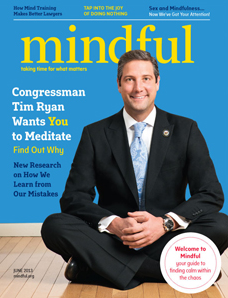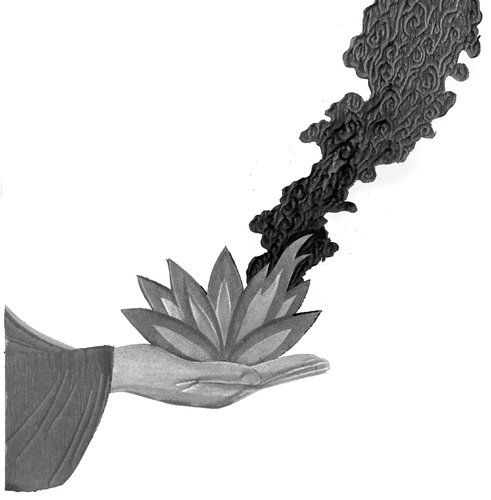Over at Maclean’s Anne Kingston surveys the world of corporate mindfulness and the Buddhist reaction. “What has gripped Western attention,” writes Kingston, “is mindfulness’s ability to improve performance—of Olympic athletes, parents, and even nations, as promised in U.S. Congressman Tim Ryan’s 2012 bestseller, Mindful Nation.” Mindfulness: the panacea to all our personal and societal ills. Tech entrepreneurs, corporations (benevolent and evil), publishers (Buddhist and non-Buddhist), and life-coaches of all stripes have been quick to capitalize on the “mindful” vogue. With the mindfulness movement in full swing, Chase bank has launched a resource center for “mindful spending” and the people behind the Shambhala Sun have premiered a mass-market lifestyle magazine, Mindful:
The first issue of the Halifax-based bimonthly bills itself as ‘your guide to less stress and more joy’ with features such as ‘The science of changing your brain.’ Publisher Jim Gimian says he wants to send ‘a very broad message that mindfulness is a lifestyle, a broadly appealing part of life and not something esoteric or foreign.’ Even the ads are ‘curated’ to reflect this message, he says; placing a full-page ad for women’s clothing line Eileen Fisher on the first page was strategic: the company also advertises in Vogue.
 But some Buddhists, Kingston notes, are wary of the mindfulness trend: “long-time practitioners worry that mindfulness repackaged as a quick fix or a commercial platform could in fact lead to mindlessness, and reinforce the very problems it’s trying to heal.” The author quotes two different Tricycle contributing editors who are critical of the mindfulness movement, Donald Lopez and Stephen Batchelor, as well as regular contributor David Loy. Lopez exposes the often-ignored historical roots of the mindfulness meditation movement, tracing its dissemination to a strategy to preserve Buddhism in Burma at the time of the 19th-century British occupation. Loy expresses doubt regarding what cultural change such mindfulness could really bring about: “If mindfulness is to make true cultural change, it must look beyond personal needs for serenity, good health or success.” He continues,
But some Buddhists, Kingston notes, are wary of the mindfulness trend: “long-time practitioners worry that mindfulness repackaged as a quick fix or a commercial platform could in fact lead to mindlessness, and reinforce the very problems it’s trying to heal.” The author quotes two different Tricycle contributing editors who are critical of the mindfulness movement, Donald Lopez and Stephen Batchelor, as well as regular contributor David Loy. Lopez exposes the often-ignored historical roots of the mindfulness meditation movement, tracing its dissemination to a strategy to preserve Buddhism in Burma at the time of the 19th-century British occupation. Loy expresses doubt regarding what cultural change such mindfulness could really bring about: “If mindfulness is to make true cultural change, it must look beyond personal needs for serenity, good health or success.” He continues,
The mindfulness movement is good for adjusting certain types of dukkha, but from the Buddhist perspective, it’s not addressing the most deep-rooted and problematical forms of dukkha. In fact, it seems to be reinforcing the kind of self-centred individualism that seems to be our more basic problem.
In a classic example of “instant karma,” a prankster tourist became trapped under a giant Buddhist temple bell last week after he and his friends decided to ring it with a bit too much force. The Sun reports that firefighters spent more than two hours trying to rescue tourist Lin Wang from under the temple bell in east China’s Shangdong province. Sometimes what goes around comes crashing down on your head in the form of a two-ton ceremonial bell. Miraculously, no one was hurt.
 In a New York Times op-ed, founder and editor of the excellent Burmese publication Irrawaddy Aung Zaw recalls suspicious government activity surrounding the initial outbreak of anti-Muslim violence in western Burma, noting that it’s “a useful distraction from Burmese grievances against China, whose heavy-handed economic activities have bred resentments across much of Southeast Asia.”
In a New York Times op-ed, founder and editor of the excellent Burmese publication Irrawaddy Aung Zaw recalls suspicious government activity surrounding the initial outbreak of anti-Muslim violence in western Burma, noting that it’s “a useful distraction from Burmese grievances against China, whose heavy-handed economic activities have bred resentments across much of Southeast Asia.”
Opposition leaders note that the violence began, suspiciously, just months after the party of the opposition leader, Daw Aung San Suu Kyi, won a landslide victory in by-elections in April 2012. Muslims were targeted with “brutal efficiency,” according to Vijay Nambiar, then the United Nations secretary general’s special adviser on Myanmar. Tomás Ojea Quintana, the United Nations special rapporteur on human rights in Myanmar, said he’d received reports of “state involvement,” with the authorities “standing by while atrocities have been committed before their very eyes, including by well-organized ultranationalist Buddhist mobs.” The government has denied the allegations, but it defies belief that the security forces and riot police, who ruthlessly suppressed protests in 1988 and 2007, have suddenly lost their nerve.
(On the other hand, Burmese military forces have brutally suppressed protests against unpopular mining projects, predominantly led by Chinese companies, but also by Indian and Korean interests. Aung San Suu Kyi has been surprisingly supportive of Chinese mining efforts despite their unpopularity among Burmese.)
Aung Zaw explains that Buddhist extremists are the legacy of the brutal military regime set on achieving “ethnic purity.”
They are everywhere: on the streets and in Parliament, wearing military fatigues, business suits and monks’ robes. Some monasteries have become breeding grounds for extreme nationalism. Many senior monks are corrupt, including those in the state-sponsored Buddhist council, the Sangha.
Earlier this week, Human Rights Watch (HRW) released its much anticipated report on Buddhist-led violence against Rohingya Muslims that destabilized the Rakhine/Arakan state last fall. Titled “‘All You Can Do is Pray’: Crimes Against Humanity and Ethnic Cleansing of Rohingya Muslims in Burma’s Arakan State,” the report describes the role of the Burmese government and local authorities in the murder of Rohingya Muslims and the forcible displacement of more than 125,000 Rohingya and other Muslims. It describes how, with the help of highly organized groups of Buddhist monks, state security forces systematically restricted humanitarian aid, imposed discriminatory policies, and have alternately turned a blind eye and participated in the violence in the ongoing conflict. That last allegation is corroborated by a recent video that’s surfaced, clearly showing security forces looking on as Buddhists wreak havoc:
WARNING: this video contains violent scenes.
Although instigated largely by Buddhist monks, the ethnic cleansing campaign, says HRW’s UK director David Mepham, has been the product of “extensive state involvement and planning.” The official report criticizes both the position of Nobel Laureate Aung San Suu Kyi and the policies of President Thein Sein, who on Monday was bestowed a peace award from the International Crisis Group. You can read the full HRW report here.
Al Jazeera was the first major news outlet to call the conflict in the Rakhine state a genocide. About a month later, Tricycle, strangely enough, became the first US-based publication to do so.
Thank you for subscribing to Tricycle! As a nonprofit, we depend on readers like you to keep Buddhist teachings and practices widely available.